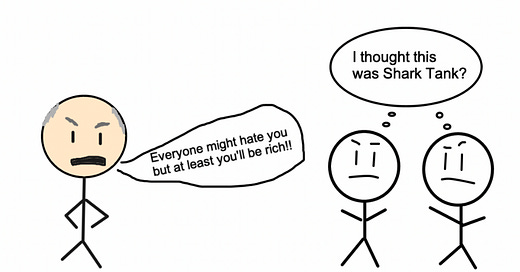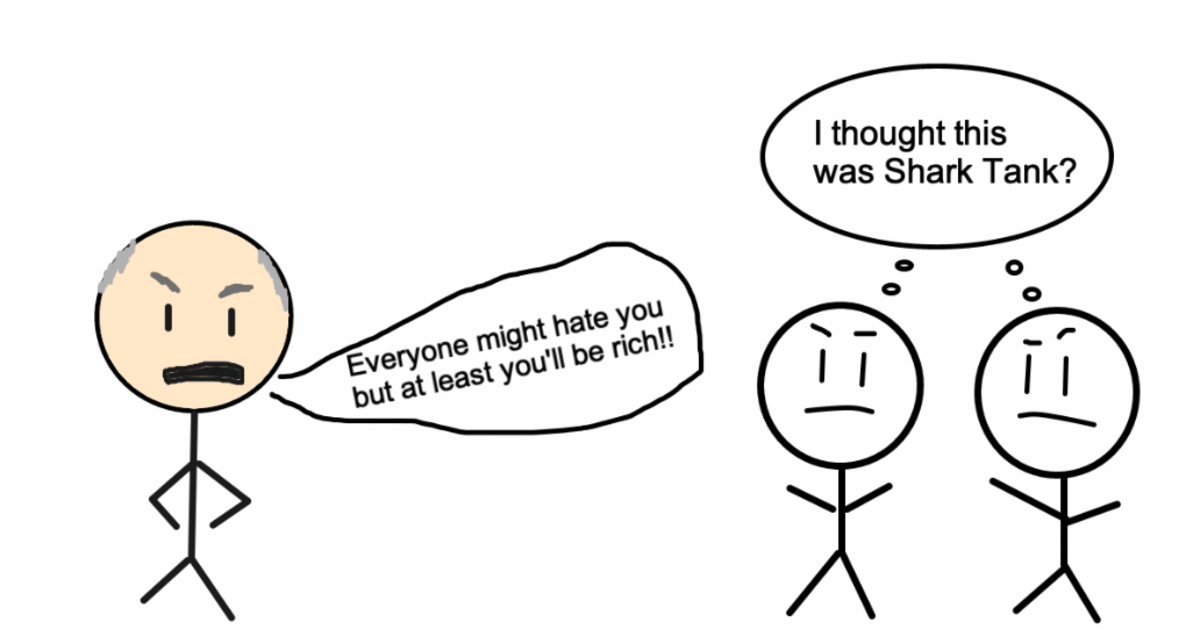Welcome to Young Money! If you’re new here, you can join the tens of thousands of subscribers receiving my essays each week by adding your email below.
Kevin O’Leary has a life that most could only dream of.
After founding a software startup, SoftKey, in the 1980s, he rode the Dot-com bubble to its peak, becoming a multi-millionaire when he sold the business to Mattel in 1999. Eight years later, O’Leary made millions more from a successful self-storage investment, and he followed this act by launching O’Leary Funds, a mutual fund company, and O’Leary Ventures, an early-stage venture capital fund.
The Montreal native has also appeared in several Canadian television shows over the last 19 years, and he is most famous for his seat on Shark Tank, where he evaluates entrepreneurial funding pitches next to Mark Cuban and friends.
So yeah, with four Emmys and a $400M net worth to his name, Kevin O’Leary has a good life. From the outside, anyway.
Three days ago, Kevin O’Leary published one hell of a hot take on Twitter dot com:
“You may lose your wife, you may lose your dog, your mother may hate you. None of those things matter. What matters is that you achieve success and become free. Then you can do whatever you like.”
Mr. O’Leary and I have different priorities, I suppose.
Twitter is an interesting place because it often reveals the inner thoughts of complete strangers, and every once in a while you come across a take like this. The crazy thing is, O’Leary isn’t alone. In fact, for many people, he simply said the quiet part out loud.
But this outlook on life is dismal at best, and dangerous at worst.
I have some thoughts.
1) Money can buy you freedom, but the never-ending pursuit of money is a prison of its own.
O’Leary states, “What matters is that you can achieve success and become free.” But what does free even mean?
According to the Merriam-Webster dictionary, freedom is defined as: the absence of necessity, coercion, or constraint in choice or action.
But when you make “success,” and specifically a “success” defined by an abundance of money, the North Star of your life, you are simply creating your own prison. Your life is wholly constrained by the driving force to acquire more, and more, and more.
Which brings me to my next point.
2) When “success” is indistinguishable from “more,” your integrity will be compromised.
Last fall, O’Leary came under serious fire for his continued support of Sam Bankman-Fried, despite the fact that the founder of the now-defunct crypto exchange likely stole billions from investors.
Mr. Wonderful both defended his position as a spokesperson for the firm and said that if given the chance, he would invest in Bankman-Fried once again. When I first read those reports, I could only think, “Why?” Why not just quietly distance yourself from the mess, or, even better, why not issue an apology for aligning yourself with an obvious fraudster?
But a few days later, I had a more pressing question: Why take the money in the first place? Seriously, you’re worth $400M, and as recently as May 2019 you referred to bitcoin as a “useless currency.” So why take the money?
Because in the infinite pursuit of “more,” integrity quickly becomes expendable. And if your integrity can be purchased for $15M, you will take that deal every time.
3) There are different types of wealth, and sacrificing a higher form of wealth for the sake of money is never worth it.
Maslow’s hierarchy of needs describes the pattern through which our needs and desires evolve, beginning with our most basic survival necessities and climbing toward our ambitions for self-actualization.
Wealth works the same way.
We tend to conflate wealth with money, but money is merely one type of wealth. In fact, it’s the most basic. Other forms, such as knowledge, time, health, relationships, and experiences, are much more valuable.
Much like food, water, and shelter, money offers diminishing returns to our satisfaction as it scales, and once we are financially secure, it’s important to focus on higher, more fulfilling forms of wealth.
If you are well-fed, would you sacrifice your self-esteem or sense of purpose for more food? Of course not. But how often do we sacrifice relationships or experiences for money we don’t need?
4) Some folks are so focused on winning the game that they never bothered to ask if they wanted to play in the first place.
“What matters most is that you achieve success and become free” is just another game. It’s one man’s opinion. There aren’t actually any rules to this thing. You don’t have to play that game, if you don’t want to. In fact, you don’t have to play any games that you don’t want to.
Status games, prestige games, comparison games, “success” games. They’re all optional. Before setting your sights on the gold, it’s worth considering which games are worth playing in the first place.
5) A surplus of “success” in one area almost always comes with a deficiency somewhere else.
The world’s 10 richest men have a combined 13 divorces. Buffett, Musk, and Gates, despite their financial and entrepreneurial successes, all suffer from somber personal lives. Naval Ravikant once said, “Envy is an illusion. The part of the person that we envy doesn’t exist without the rest of that person. If we aren’t willing to trade places with them completely - their life, their body, their thoughts - then there is nothing to be envious about.”
Extreme levels of outward success often come with similar levels of internal turmoil. More often than not, the most public successes aren’t living the most enviable lives. They are just better at hiding the skeletons in their closets.
6) A life that is rich in all other regards but deficient in relationships is hollow at best, and depressing at worst.
Say you achieve “success” and “freedom” as O’Leary defined them, but it costs you your family and friends. Is it worth it? I don’t think so. What's the point of having the world if you have no one to share it with? Do you really want to be king if it means residing in a castle of one?
Our lives are nothing if not a collection of shared experiences with our loved ones. You can’t put a price tag on that.
7) Misery is often preceded by unchecked ambition.
Ignore the first six, and you’ll likely experience number seven.
- Jack
I appreciate reader feedback, so if you enjoyed today’s piece, let me know with a like or comment at the bottom of this page!
Young Money is now an ad-free, reader-supported publication. This structure has created a better experience for both the reader and the writer, and it allows me to focus on producing good work instead of managing ad placements. In addition to helping support my newsletter, paid subscribers get access to additional content, including Q&As, book reviews, and more. If you’re a long-time reader who would like to further support Young Money, you can do so by clicking below. Thanks!
Jack's Picks
Semafor’s Max Tani wrote an interesting piece explaining how Spotify’s podcast bet went wrong.
For my football fans, Kevin Clark did a great job covering the greatness of Patrick Mahomes.






